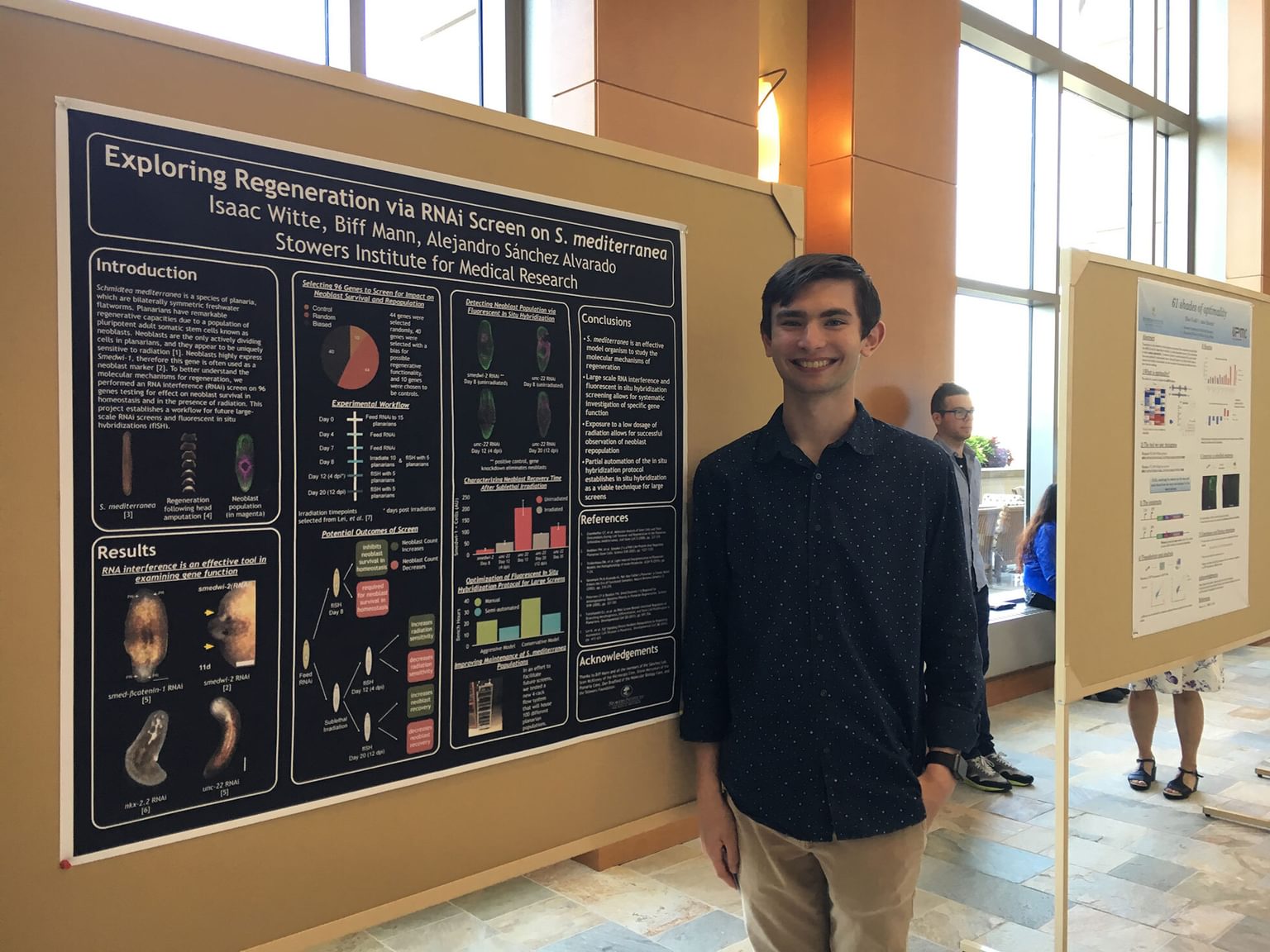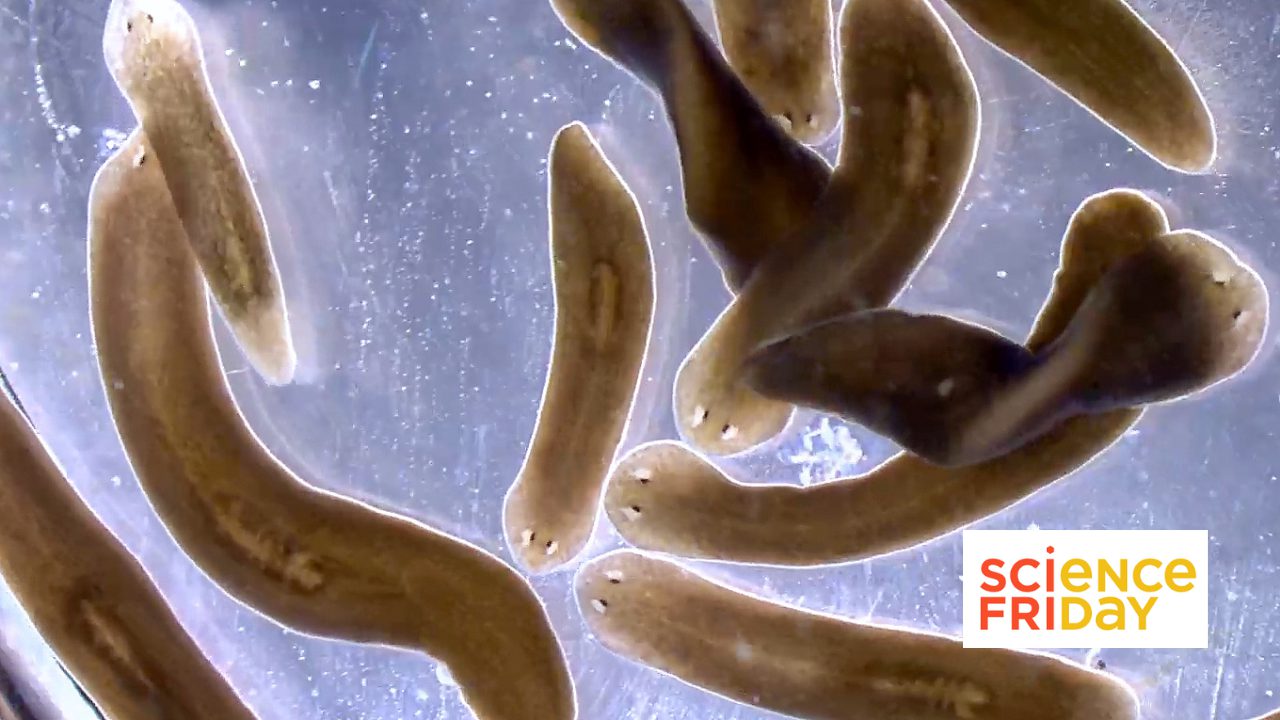In The News

07 January 2026
Investigator Kamena Kostova, named ‘Cell Scientist to Watch’
From the Journal of Cell Science, Investigator Kamena Kostova named a 'Cell Scientist to Watch'
Read Article
News
Isaac Witte, now a Ph.D. student at Harvard University, publishes study on new programmable method for gene integration in human cells.

Former Stowers Summer Scholar Isaac Witte presenting a poster in 2017 in the Institute's gallery.
Former Stowers Graduate School Summer Scholar Isaac Witte, now a Ph.D. student in the lab of David Liu, Ph.D., at Harvard University, recently published a study in Science describing evoCAST — a powerful new platform for efficient, programmable gene integration in human cells. Developed in collaboration with the lab of Sam Sternberg, Ph.D., at Columbia University, evoCAST represents a major step forward in the field of genome editing.
Stowers Institute Postdoctoral Researcher Biff Mann, Ph.D., from the lab of Stowers President and Chief Scientific Officer Alejandro Sánchez Alvarado, Ph.D., mentored Witte during his time at the Institute in 2017. “It is extremely rewarding to see Isaac’s subsequent work turn into such an extraordinary study,” Mann said. “evoCAST could have major implications for human health, from enabling new gene therapy approaches to advancing personalized medicine.”
Unlike traditional CRISPR-Cas9 techniques that require cutting both strands of DNA, a process prone to inefficiencies and off-target effects, evoCAST uses an optimized version of a bacterial enzyme complex called a CRISPR-associated transposase (CAST). This allows large DNA segments to be inserted into the genome without any cutting, improving both precision and safety.
“Many of the key advantages of evoCAST stem from the system’s origins as a natural system for RNA-guided gene integration in bacteria,” said Witte. “CASTs represent nature’s own answer to a longstanding question in the genome editing field: how do we install large genes into the genome in a programmable fashion?”

Schematic of evoCAST, a system that combines CRISPR components (blue) and transposase components (yellow) to install entire genes into the human genome (orange).
Mann added, “This is a one-step process that avoids many of the risks associated with genome editing. The old way is problematic because cutting the genome is not perfectly efficient. Even when perfectly cut, the cell’s repair machinery does not always work as intended, resulting in further mutations to the DNA. This new platform is a big deal in terms of making therapies safer and more reliable.”
Mann, who wasn’t involved in the evoCAST study, commented about Witte’s time at the Institute, “The experience students get here equips them to contribute to high-impact discoveries later in their careers.”
“The Summer Scholars program was a fantastic introduction to science at the bench,” said Witte. “Working alongside Biff each day gave me the tools and confidence to help me develop as a young scientist.”
Witte’s team used a technique called phage-assisted continuous evolution (PACE) to refine the CAST system and dramatically boost its performance in human cells. The result was a 200- to 400-fold improvement in gene integration efficiency, with the ability to target dozens of human genomic sites and deliver therapeutic genes with high precision.
“In this study, we learned that the native activity of CAST was insufficient for genome editing in human cells,” said Witte. “However, we could remedy this through the directed evolution PACE technique.”
Mann sees clear relevance to the work happening across the Institute and at other research institutions. “Nearly every lab here and beyond relies on tools for genome editing,” he said. “New techniques like evoCAST could open doors to experiments — and insights — that weren’t previously possible.”
In The News

07 January 2026
From the Journal of Cell Science, Investigator Kamena Kostova named a 'Cell Scientist to Watch'
Read Article
#Stowers25: Celebrating 25 Years
06 January 2026
Alejandro Sánchez Alvarado, Ph.D., reflects on a year of discovery, gratitude, and the community that helps support our mission.
Read Article
In The News

01 January 2026
From Science Friday, President and CSO Alejandro Sánchez Alvarado talks about the science of regeneration and the biology lessons we can carry into the new year.
Read Article
